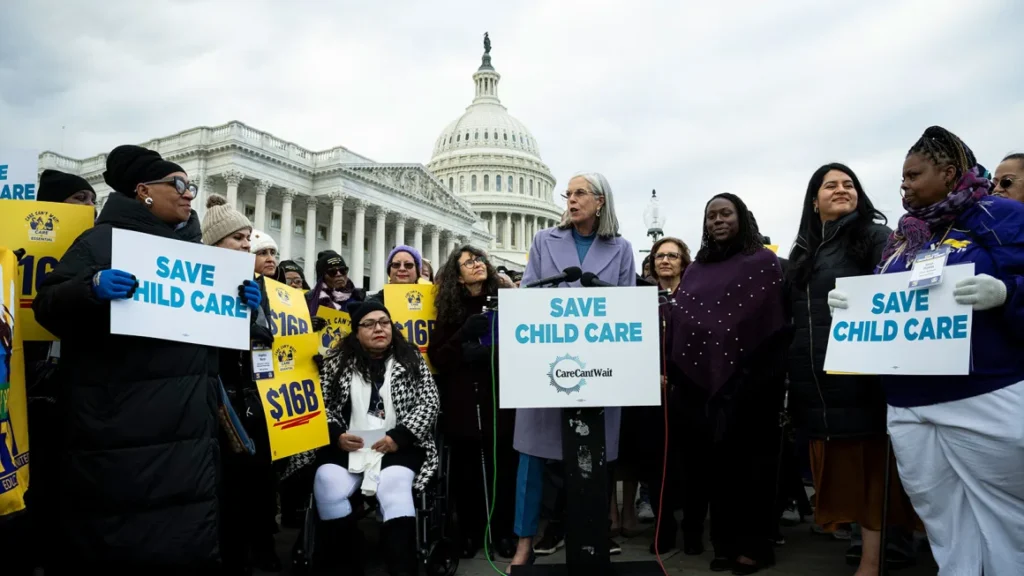
Editor’s Note: Reshma Saujani is a leading activist and the founder and CEO of Moms First, a national nonprofit organization. The views expressed in this commentary are her own.
Kellyanne Conway was right.
The Biden campaign got some bad news last week: His support among women, who helped deliver him the presidency in 2020, is shrinking. Despite Democrats betting big on abortion to turn out women, more women are focusing on inflation — and saying they were better off financially under former President Donald Trump.
“Women are not single-issue thinkers,” Conway told The New York Times. “Therefore, they are not single-issue voters.” As a lifelong Democrat and the founder of Moms First, a movement fighting for parents to get the support we need, I agree with Conway.
Put another way, this isn’t going to be an “abortion” election or an “economy” election: 2024 is going to be the mom election.
For months, parents have been citing inflation and personal finances as key factors in the upcoming election. And in the Federal Reserve’s annual Survey of Household Economics and Decisionmaking, released last month, parents reported a sizeable downturn in their financial wellbeing since 2021.
That decline is largely attributed to one key cost: child care. During the pandemic, parents had support, from the expanded child tax credit, which provided extra money for families and helped lift millions of children out of poverty, to subsidized care centers. Both have since lapsed, leaving many families to teeter on (or fall off) a “child care cliff.”
In 2024, the cost of child care — the cost of motherhood — has become untenable.
In every state, the average cost of child care is now higher than the average cost of rent, reaching obscene price tags that leave more than a third of parents with children under 18 resorting to credit cards or acquiring other debt. Nearly the same number are leaving the workforce or have left already due to the cost of care.
Many politicians are, once again, missing the forest for the trees. They don’t see “motherhood issues,” such as child care and paid leave, as substantive, economic issues worth fighting for. And they don’t see abortion as a motherhood issue, even though 60% of people who’ve had abortions are mothers.
Some politicians love to grandstand over family values while making it harder to plan a family: from failing to protect IVF, to forcing women to carry dangerous pregnancies (which could put the mother’s health at risk or impede their ability to have children in the future).
But for many moms, the through line is obvious. At every stage of our lives, we’re losing agency over if, when, and how we choose to become a mom.
These political maneuvers are about controlling the “life of the mother” — a phrase we used to hear a lot as an exception in abortion bans — which, in recent years, have been proven difficult to administer (although abortion bans generally don’t respect the mother’s life or autonomy anyway). The same goes for threats to restrict birth control that would likely lead to unplanned pregnancies, or paid leave deserts that force women back to work two weeks after birth, still bleeding.
RELATED ARTICLEOpinion: How a restaurant menu became a metaphor for how America fails its mothers
At each phase of a woman’s life — whether we’re 15, 35 or 55 — many are left distressed and distracted by these attempts to control us.
But this also poses an opportunity for moms to build some political power.
Motherhood can be the foundation for a powerful new political identity. If we organize as one bloc, we can fight for interconnected issues: abortion and inflation, minimum wage and universal pre-K, and every policy that affects the life of the mother. And maybe, finally, we can win them all.
Many moms understand that “the life of the mother” isn’t just about abortion — though it remains, always, at the forefront of our advocacy. It’s about a whole slew of lifelong issues that affect our finances, our families and our freedoms.
And we know that we can’t progress in one of these issues without championing all of them.
It won’t be easy. For decades, moms have been divided — working moms versus stay-at-home-moms, single moms versus coupled moms, Moms for Liberty versus Moms Demand Action.
But I have reason to hope that this bipartisan coalition is possible. Just this week, a Pivotal Ventures poll found that a majority of both Democrats and Republicans said they’re more likely to vote for a candidate if they know their position on caregiving.
And mothers have long been on the front lines for the most important causes of our time — from racial justice and gun safety to criminal justice reform and climate change. We’ve proven that, when it comes to issues that matter to us, moms will find a way.
So when Biden and Trump face off in Thursday’s debate, moms will be listening closely. Are they making empty promises? Are they dismissing us as “soccer moms”? Are they talking to us, as Conway put it bluntly, “from the waist down”?
If moms come together as a united coalition, we can change the way politicians value us. Maybe, finally, they will see us as whole people, vie for our vote and treat us as the true, powerful constituency we are.


